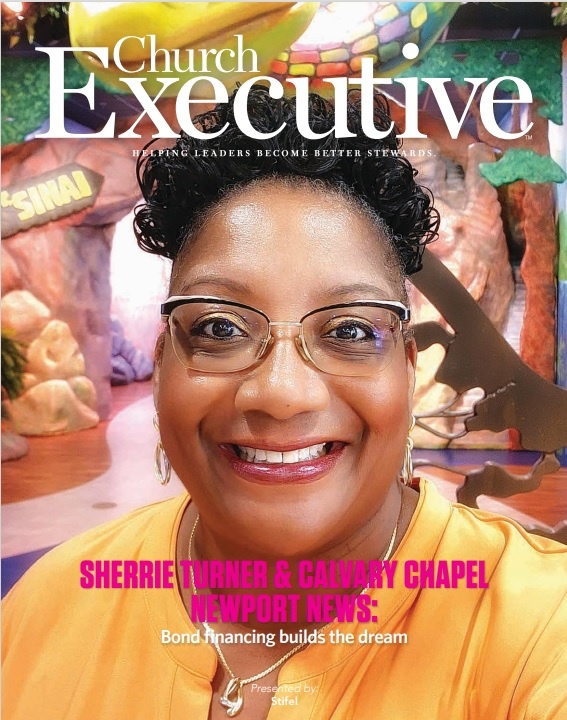
By RaeAnn Slaybaugh
Driven by Senior Pastor Tony Clark’s heart for the youngest members of the church, Virginia’s Calvary Chapel Newport News had big goals for its new children’s wing. Really big.
Fortunately, he had just the right person on staff to take the helm. With decades of high-level corporate management experience under her belt, Director of Business Operations Sherrie Turner, CCA, SPHR, SHRM-SCP, took a well-informed approach to due diligence when vetting the church’s funding options. In doing so, she uncovered a less conventional, often misunderstood path to making this state-of-the-art project a reality — bond financing.
It was the right approach for a myriad of reasons, but above all: peace of mind and room to maneuver.

When Sherrie Turner joined the staff at Calvary Chapel Newport News (CCNN) in 2004, she brought a wealth of HR, training and development and project management experience having worked for Fortune 500 companies for decades.
She moved to the area for family reasons (her parents retired there) and to do some work to qualify for medical school. Turner began attending CCNN and became friends with Senior Pastor Tony Clark.
Though she was accepted to a medical program upon finishing her coursework, an opportunity presented itself and Sherrie shifted gears once more, moving to the Washington DC area to do consulting for a Fortune 50 company as well as — among other clients — one of the top 25 corporate universities in the country at that time.
Throughout, she stayed in contact with Pastor Clark.
“He would just call and check on me and say, ‘How are you doing? How’s your walk going?’” Turner recalls. “And he kept saying, ‘You’re doing these great things, but have you thought about using the skills God has given you in ministry?’”
Meanwhile, God kept nudging Turner, too: “He just kept saying, do you trust Me?”
When family health reasons presented a fork in the road — to pursue the C-suite or move back to Newport News — Turner opted to move back to Newport News. She took a job at the church while still doing some consulting work with her previous employer. Eventually, she transitioned into full-time ministry work.
A big vision for children
In 2018, Pastor Clark set his sights on a world-class children’s wing. It was a lofty goal, but as Turner points out, Clark has always had a heart for the children of the church.
“He wants them to be able to learn on their own level, in ways that are relevant to their age, related experiences, and in an environment that’s fun and appealing,” she says. “Pastor Tony has often said that our competition for the minds of children isn’t with other churches, but with spaces like [Walt] Disney World.”
In invoking environments like that, it was clear from the beginning that this would be no ordinary, run-of-the-mill children’s space — and it isn’t.

As children advance down the hall of Kidz Bible Adventure, they are immersed in an environment where the stories of the Bible (the Garden of Eden, Daniel in the Lion’s Den, David & Goliath, Noah’s Ark and more) come alive, almost as if they are transported to that time period. Through the use of theming, multimedia components, sounds, lighting and special effects, children are immersed and enveloped in a captivating environment that stimulates the senses as their hearts are being drawn toward God.
As they learn about each story, various elements activate to engage and enthrall them in the experience. They hear the sounds of the jungle and the hiss of the snake in the Garden of Eden. The burning bush ignites as they learn about Moses. They sit inside the Big Fish as the floor takes on a water-like effect and they are surrounded by sounds of the storm and flashes of lightning as they learn about Jonah. Paw prints illuminate on the floor as the walk toward the Ark. These are just a few of the thoughtful, state-of-the-art elements that make this space one in a million.
“We want the experience to be so engaging for children that they either don’t want to leave or can’t wait to return,” Turner explains. “And they don’t want to leave; they say they’re having too much fun. That gives the parents comfort and encouragement; they’re excited to see their children growing in their walk with God. The enthusiasm of the children is also a great way to inspire parents to return who may not have an active or strong faith walk.”

Funding the dream: a less conventional path
Of course, smartly funding this vision would be crucial. Fortunately, this wasn’t the church’s first foray into large-scale financing.
In 2019, it secured financing through St. Louis, Mo.-based Stifel, which has an industry-focused Religious Finance Practice, for renovation of 43,000 square feet of CCNN’s 93,000-square-foot facility to include a new, 1,200-seat sanctuary; expanded lobby; multiple café spaces; and expansion of the children’s ministry and educational spaces in the Christian Academy.
Stifel orchestrated a $6-million bond issue: $3.6 million for the renovation project and $1.9 million to retire existing debt from its original land-locked campus that they vacated in 2018.
In discussions about church lending, bond financing doesn’t come up as often as more traditional lending options. Many church leaders either aren’t familiar with what it entails, or they hold some misconceptions about the process. Stifel Managing Director Dave Schlosser knows this all too well.
“This is my 37th year in the church bond business,” he says. “Many times, I’ll get a call from a pastor or administrator, and I’ll explain our program. When the word ‘bonds’ comes up, often the first response is, ‘Oh, do we have to sell bonds to our congregation?’ My response is, ‘not with our program.’”
Schlosser acknowledges that many church leaders have secondhand knowledge of how some bond programs work, mostly where bonds are required to be sold to church members. In many of those cases, financing is frustratingly delayed until all of the bonds are sold.
“Our program is completely different and essentially relieves congregations from the burden of supporting the bond issue,” he says. “Once they understand the difference between needing to sell bonds internally from being able to tap into Stifel’s national retail investor network, their mindset completely changes.”
For her own part, CCNN’s Sherrie Turner overcame any misconceptions about bond financing with the church’s 2019 funding package. “Really, I think it was definitely a move of God to expose me to bond financing as an option, because I hadn’t been familiar with it,” she says. “And as I started to dig more into it, I was like, Wow, where have you been all of my life?”
Turner and her team especially appreciated not having to sell bonds to members while a capital campaign was underway, simultaneously, to help fund the renovation project and service debt. Turner says the church would not have pursued Stifel’s offerings if this were a requirement.
Fast-forward a few years, and interest rates are at historic lows. In 2021, CCNN leaders and the religious finance team at Stifel met to recalibrate.
The bonds issued in 2019 were issued at interest rates ranging from 3.15% to 6.25%. “The way a bond issue works is that we provide a series of interest rates with different maturities,” Schlosser explains. “Our investors then buy the bonds with maturities and interest rates that best fit their personal investment strategies.
In 2021, in the midst of a historically low-rate environment, Stifel was able to refinance the church’s existing 2019 bonds and provide a series of interest rates between 1.15% to 5.10%. This significantly lowered CCNN’s payment. These freed-up funds were instrumental in maintaining stability at the church during COVID. They were also vital for increasing the church’s Benevolence outreach during the pandemic and continuing to expand the educational and ministry opportunities available to both the children’s ministry (the development of a special needs program) and the Christian Academy, which was expanded, at that time, to offer services for infants through 8th graders.
“We still continued to be aggressive about how we were paying down debt, but it just gave us financial deftness if we needed it,” Turner points out. “And at the time, even though the school was closed for a bit, we opened up for essential workers during the pandemic.”

More than numbers
Refinancing the bond package did more than make more ministry funds available; it provided long-term peace of mind and flexibility for the church. Here’s how.
A 25-year fixed rate. Schlosser says he believes the 25-year fixed rate element of the bond financing package was “the biggest advantage” for Calvary Chapel — especially in a climate when, at the time, anything more than a five-year term was virtually unheard of.
“That would have meant that at the end of the five years, the church would have to go back into the market and either reset the interest rate or refinance the transaction in total if their existing lender wasn’t going to help them,” he points out. “So, to me, it was really that long-term fixed rate that turned them to Stifel versus a traditional lender.”
Turner echoes his sentiments. Especially given the volatility of the current market, she says she appreciates not having to worry about future interest rate hikes and balloon maturities inherent to traditional financing.
“To not have to go through that is amazing,” Turner points out. “It gives us confidence in our foundation for strategic planning.”
No prepayment penalties. As she mentioned, Turner and her team always planned to aggressively pay down the debt. So, the absence of prepayment penalties was important.
“Not only could the church prepay at any time, [Stifel] could reset their payment lower,” Schlosser says. “That’s something a traditional lender can’t provide.”
No ongoing financial performance covenants. Many commercial loan structures have yearly or quarterly performance ratios that must be met. In contrast, Stifel has no ongoing financial performance covenants which a church must meet.

“I think the takeaway, there — and with bond financing generally — is that as long as you make your scheduled mortgage payments, you’re never going to lose the loan,” Schlosser says. “It can never be taken away from you.”
Turner agrees that this is an attractive component; for CCNN, it means not having to go back and ask for permission to pursue new growth initiatives that God might be laying on the ministry’s heart.
“It’s important that — as we exercise our fiduciary duty through excellent financial stewardship — outside constraints don’t obscure or hinder the vision that God has given Pastor Tony for the church’s ministry,” she explains. “Stifel’s approach doesn’t put limitations on or interfere with our ability to be flexible, agile, and sensitive to how God is leading in our ministry initiatives.”
An open-ended mortgage and no restrictions on asset additions. The open-ended mortgage element allows CCNN to come back to Stifel and issue a new set of financing for whatever project the church is considering. Schlosser explains: “If interest rates have increased from the original financing, we don’t touch that initial series of financing; it remains outstanding. We come back and we issue the new bonds at whatever the current interest rate market is.” This is in contrast with most traditional loan structures, he says, that require a church to refinance its initial loan at a higher rate because the interest rate markets have changed. Indeed, as Schlosser reiterates, the open-ended mortgage is a great fit for a phased approach to developing a campus. “And with our knowledge of the church organization as an existing client, it makes the process much easier,” he adds.
Having no restrictions on asset additions means there are no approvals necessary for any projects the church might want to do moving forward, or on buying major assets.
“That’s significant because with many traditional loan structures, the church might need lender approval for other projects or capital expenditures,” Schlosser explains. He expounds that with no restrictions on asset additions, “our program is very ministry-friendly in that churches don’t have to come back to us for any ‘approvals’ in the future.”
These elements will be essential as CCNN continues to develop and expand its junior high and high school spaces in a similar fashion to the children’s ministry, in accordance with Pastor Clark’s heart for youth. The intent with these spaces is to rival a fully immersive and fun environment (Dave & Buster’s or Busch Gardens, for example) where the youth are engaged on all levels and excited to come and learn about God.
“If needed, the open-ended mortgage provides an option for such future ministry growth initiatives,” Turner explains. “And as the Director of Business Operations, I’m the one who would compile all the financial information — the profiles, the loan statements and so on — if we wanted or needed to pursue financing someplace else. There’s no sense of, Oh, we’re going to have to put together some type of package or some type of profile to justify what we’re trying to do,” she points out. “To know that Stifel won’t be as onerous in that regard, that’s exciting. That just gives us a lot more flexibility as a ministry to be agile and pursue what God has for us.”

No deposit relationship required. In choosing to go with a bond financing initiative with Stifel, CCNN wasn’t forced to give up its relationship with its existing financial partners for depository purposes. As Turner recalls, this was especially important during the pandemic, when a relationship with a local banking institution could facilitate expedited access to COVID relief funds.
Beyond this, she says she enjoys the peace of mind that comes with being able to maintain the church’s great relationships with local and national banks. “The fact that I didn’t have to change accounts and restructure things, that was definitely encouraging,” she says. “I just didn’t even have to think about it.”
Supporting other Christians. In using bond financing with Stifel, Turner says she knows that CCNN is supporting other Christian organizations and Christians themselves who are investing and thinking about their long-term futures.
“Such an investment opportunity is really exciting, and it’s unique,” she says. “It’s a very different approach than when you’re working with traditional banks.”
Clearly, there were plenty of practical reasons for CCNN to use bond financing to fund its amazing new children’s wing. For Turner’s part, these practicalities mesh well with the church’s mindset of money as a tool for ministry, not the driver of ministry.
But what she has experienced working with the entire religious finance team at Stifel goes well beyond the transactional.
“They’ve recognized their role in helping be a partner in kingdom work,” she says. “The tools are flexible enough that they don’t impinge upon, hinder or cause constraints for our senior pastor and the leadership to move as God has moved them.”
And when it comes to ministry, this kind of freedom is priceless.



